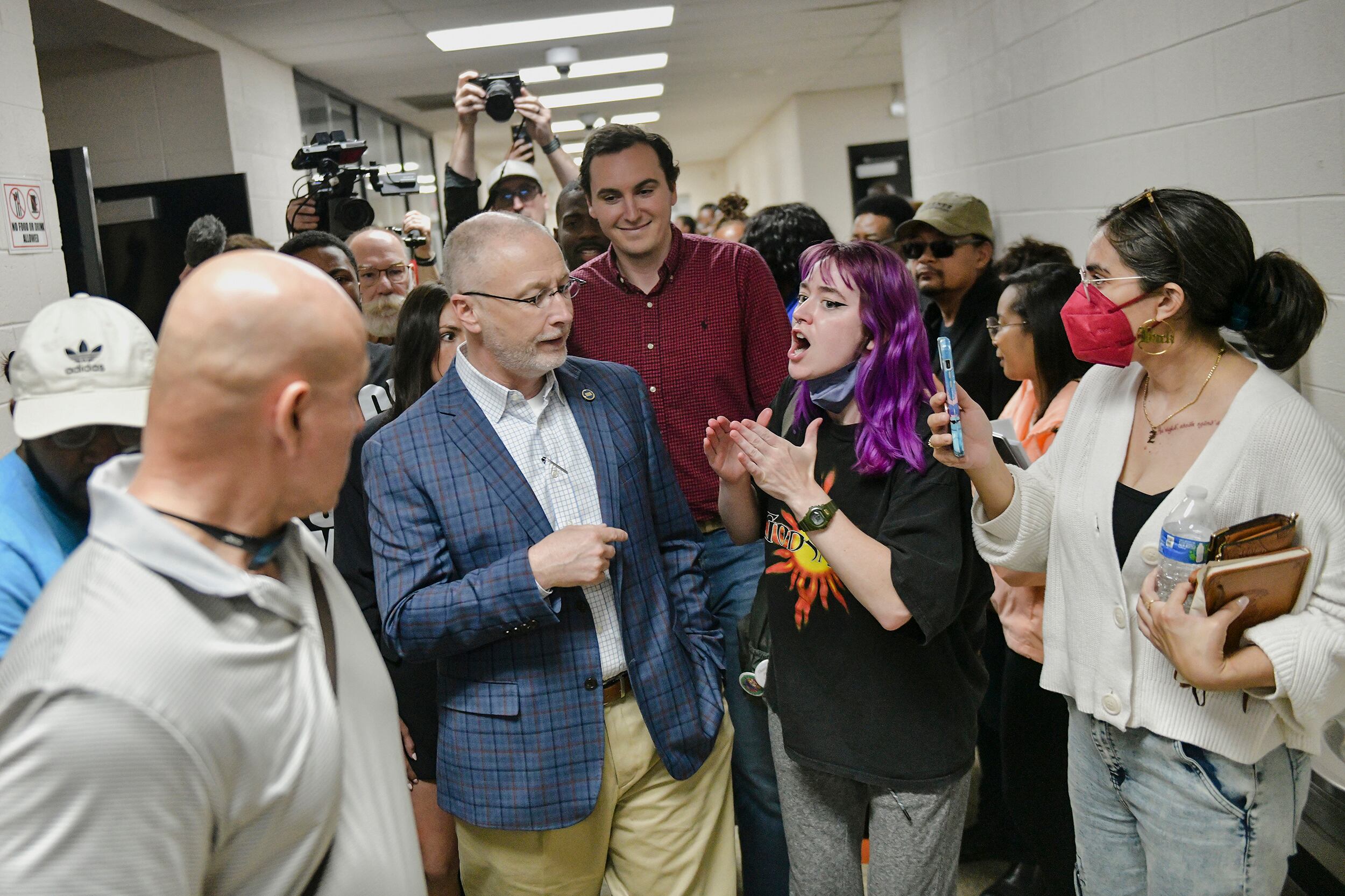Sign up for Chalkbeat Tennessee’s free newsletter to keep up with statewide education policy and Memphis-Shelby County Schools.
Memphis education leaders are pushing back on what they call misleading and offensive language from lawmakers leading the charge to turn over control of the school district to the state.
Rep. Mark White and Sen. Brent Taylor, both Republicans from Memphis, told WKNO/Channel 10 earlier this month that in January they will bring back their bills to create a state-appointed board to lead Memphis Shelby-County schools. In the interview, Taylor called the current school board members “dumbasses.”
“The school board ranks right up there with jock itch, in terms of what people think about them,” he said.
The district declined to comment, and Taylor did not respond to Chalkbeat’s requests for comment. But a school board member and local advocates condemned Taylor’s language.
Taylor is known for making off-color and often incendiary public comments, particularly during General Assembly debates. While the comments aren’t surprising, education officials in Memphis say the rhetoric further inflames already tense relations between city and state officials.
“I think he’s become emboldened, given the tenor of our current national politics that has trickled down into our state and is now trying to trickle down into our local politics,” said MSCS board member Natalie McKinney.
The school board faced backlash in the winter for ousting former Superintendent Marie Feagins, a move White and others publicly urged against. Feagins filed a lawsuit against the board in February, saying her firing violated the Tennessee Open Meetings Act.
The district in recent years has faced significant academic and financial challenges, in addition to repeated administrative drama at the superintendent level. Feagins lasted less than 10 months in the job before her ouster, which prompted White to introduce his bill to rework district leadership.
In an interview, White told Chalkbeat that he’s not worried about the senator’s language.
“We’ve all got our style, so I’ll let Senator Taylor do his thing,” White said. “He’s doing a great job as far as I’m concerned.”
But Cardell Orrin, who leads Stand for Children Tennessee, a Memphis-based nonprofit working to promote equity in school outcomes, called the senator’s language “very clearly offensive.”
“We have a high tolerance for ignorance here, but this white suburban Republican legislator is comparing school board members, who are mostly Black women, to jock itch,” he said. “This senator whose main hashtag is ‘Make Memphis Matter’ … is doing all of these things to assert control over this place that he doesn’t live in.”
During the WKNO interview, lawmakers cited MSCS’ recent state test scores as a main reason a leadership change is needed, calling the “small incremental increases” insufficient. Just over 29% of the district’s students in grades 3-5 passed in reading this year, a critical reading benchmark for the state, up from 26% in 2023-24.
“We’re not meeting the mark on preparing our Memphis-Shelby County students, which are the inner city kids, to be able to get those jobs and to move out of high school,” White told Chalkbeat. “It’s no longer about any particular school board or any particular superintendent. This has been going on for decades, and it’s just time for intervention.”
Dolores Rivers, interim director of the Memphis-Shelby County Education Association and a retired teacher of 26 years, said that minimizing the district’s progress is “a slap in the face of the teachers that are in the classroom.”
“People need to understand that our kids come to us behind; they start behind,” she said. “Proficiency is the goal that we’re trying to attain. Growth is the path.”
MSCS outpaced average state improvement on some testing benchmarks, including third-grade reading proficiency. But the district continues to lag behind statewide results, with 41.7% of all Tennessee third graders scoring proficient on the test. White said getting MSCS to hit that state figure is the goal.
While on WKNO, White and Taylor compared MSCS test scores to smaller, less diverse nearby school systems like the University Schools, which is an independent public school system that’s been run by the University of Memphis since 2024.
But Rivers said those comparisons are unfair, noting that the district has a waiting list.
“We have to accept everybody,” she said.
Memphis students have to apply to the University Schools system, and are required to show a “satisfactory conduct grade and attendance record” to be admitted. White said the schools serve “many of the same students” as MSCS because they pull from the same ZIP codes.
“And whether it’s fair or not, that’s not the point,” he said. “The point is, year after year, Memphis-Shelby County Schools does not perform.”
In their WKNO interview, Taylor and White said the University School system serves an equal number of white and Black students. But according to a 2024 report, 31% of the district’s 1,200 students are Black and 53% are white.
And 2024 data from the Tennessee Department of Education shows that the percentage of economically disadvantaged students in the University Schools system ranged from 7% in elementary to 14% in middle school, compared to 53% of MSCS students district-wide.
McKinney said those differences in student demographics matter.
“This attempt to dissect poverty from the ability to take advantage and have full access to all your educational opportunities is something that we need to stop lying to ourselves about,” she said.
Orrin was one of many community leaders to launch the “Save Our Students” initiative fighting against the previous round of state takeover bills in the spring. He acknowledged that there is “a lot to improve at the district,” including holding board members and district leadership accountable.
But Orrin says the lawmakers’ reasons for upending the MSCS school board “keep changing over time,” and the $6 million forensic audit set to start this month — which the lawmakers said will guide their efforts going forward — will only make that worse.
“They’re on a hunt for why they’re doing the state takeover again, so it’s another rationale,” he said. “Again, we don’t have any context or any prior consideration of what they’re looking for.”
The state hasn’t conducted an independent investigation of any other system, Orrin said. And the lawmakers admitted they’ll likely only have partial results by the time the legislative session ends.
White says he’s confident the partial results will be enough to inform how he and Taylor can reconcile the two state takeover proposals the duo introduced earlier this year. But he said there’s nothing the audit could find that would make him change his mind.
“We need more than advisers right now,” he said. “You have to have this complete overhaul to break down that bureaucracy.”
Bri Hatch covers Memphis-Shelby County Schools for Chalkbeat Tennessee. Reach Bri at bhatch@chalkbeat.org.






